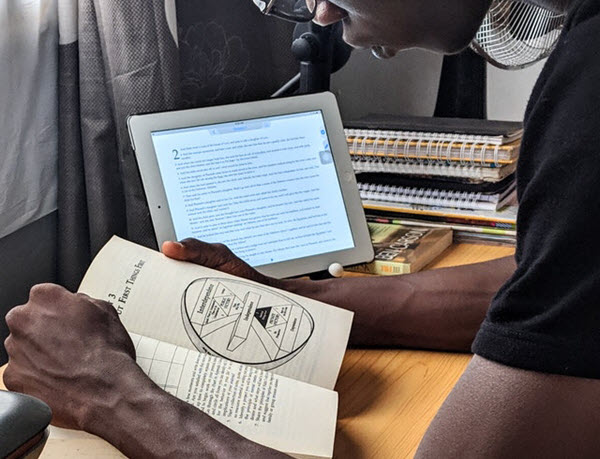Remembering What You Read: 7 Simple Tips to Remember More

You had just finished reading your latest book and it was great. Unfortunately, you can’t remember a thing. Frustrating, right?
Well, that used to be me. I got frustrated by that and so I embarked on a journey to find out how to remember what I read.
I started reading articles after articles. In the end, out of all the blog posts I have read, I have summarized them into these 7 tips on how you can start remembering what you read.
And the best part?
They aren’t time-consuming actions like re-reading that entire 500-page non-fiction book. Instead, these tips albeit small, can have a massive impact on how much information you retain.
Take notes.

You don’t have to restrict yourself to taking notes on paper. Do whatever suits you.
If you are reading a hardcopy book, it would be tremendously helpful to read it with a pen or a pencil.
If you are reading an electronic copy, no worries as well. You can still take notes electronically. Perhaps the best app in my opinion is Evernote. You can seamlessly sync your notes across different devices and can easily search for them, too.
What kind of notes should you be taking?
As a general guide, these are the pointers that would be beneficial to take note of:
- Can I summarize the past few pages into 1-2 sentences?
- Do I agree with what the author writes here?
- What other concepts is this point similar to?
It may take quite some time to take notes. Hence, the best balance I recommend (find out what works best for you!) is to pause after reading each chapter. Then, summarize it in 2 to 5 sentences.
These notes, especially when they are easily searchable, can help to refresh your memory on what the book is about.
Practice the Feynman Technique.
This technique is named after Nobel Prize-winning physicist Richard Feynman who was called the “The Great Explainer”. He was given that name because he could relay complex topics in simple ways.
This technique consists of 4 steps (use it after reading your book):
1. Pick a concept from the book.
There are many concepts in a book and you don’t have time to do this for all the concepts. Just choose the concept that you want to remember the most. It could be one that you can apply in your life.
2. Teach it to someone who does not know the concept.
Make use of daily conversations to introduce the concept. One way I like to do it is to introduce the concept to my friend and then ask him if he agrees with it. This can not only help you identify the gaps in your knowledge, but also cause you to see new perspectives.
3. Go back to the book when you have identified the gaps in your knowledge.
Reread the portion of the book containing the gap in the concept.
4. Simplify and use analogies (optional).
It would be good to work on this step. However, you can skip it if you don’t have time. This step is more relevant to those who have to teach the concept to a large audience.
Build mental connections while you read.
This helps to ‘anchor’ your new knowledge on your pre-existing knowledge, allowing you to remember them more easily.
The first type of mental connections to make are links to other concepts you have read about. If you have read about a related concept in the same field, drawing that connection to that concept can help you remember the new concept better.
The second type of mental connections are links to your personal experiences. Ask yourself: Have I encountered this principle in my life before?
A simple example was when I was reading Daniel Kahneman’s book, Thinking Fast and Slow. I read of the concept “regression to the mean” and I observed that, I, too, made the mistake in my life!
I assumed that football teams who won the last game would continue winning, but the fact is that their chances of winning the next game was lower.
This connection I made to my experience allowed me to remember that concept more clearly.
Become familiar with the topic beforehand.
One common characteristic I observed among people is that when they don’t understand a phrase, their minds subconsciously do not absorb that information.
For example, if you did not know what regression to the mean was, you simply subconsciously skipped that part of the text above. You may have read it, but you didn’t completely understand what it meant.
To prevent this, the best way is to familiarize yourself with the topic beforehand. At the very least, know the fundamentals of the topic.
Since this is subconscious sometimes, you would want to stop immediately once you come across an unfamiliar term/concept. Note the term down somewhere so that you can read more about it afterwards.
One pro tip I recommend is to read books that match your current level of knowledge. If you know little to nothing on business management, try not to read the “bestseller list” immediately. Look for a book that covers the basic on business management.
Pause occasionally to digest the material.
Pausing occasionally can give you time to build mental connections. As I mentioned earlier, these connections ‘anchor’ your new knowledge and help you remember them.
This tip is very useful if you have just read a very dense paragraph. Don’t be afraid to pause to digest it.
In an extension to this point, it is helpful to spend some time to let your mind wander after the period you spent reading your book. This time can be used to build valuable mental connections.
It is also during this time that I come up with ingenious applications of that knowledge into my life.
You should give that a shot.
Take into account your ultradian rhythm.
This relates to those periods of high-frequency brain activity which generally last for about 90 minutes. They are usually followed by lower frequency brain activities lasting for 20 minutes.
You ideally want to read your book within the period of high-frequency brain activity. This can not only help you read your book faster, but also retain information more effectively.
Hence, you should not be reading more than 90 minutes straight.
Read the hard-copy version of the book.

Researchers have found that reading electronic copies of books can undermine the strength of your memories. This is because flipping the pages of a hard-copy book creates a “tactile sense of progress”, according to lead study author Dr Anne Mangen.
See Also: 13 Ways to Get More Reading Done (Even If You Don’t Have the Time)
Conclusion
It is natural to forget things after you have read them. However, this does not always have to be the case.
As long as you follow the 7 simple tips above, I am sure you are very close to remembering everything you read. And you can start fooling others that you have a photographic memory.
Which tip do you think will be the most useful for you? Why?


